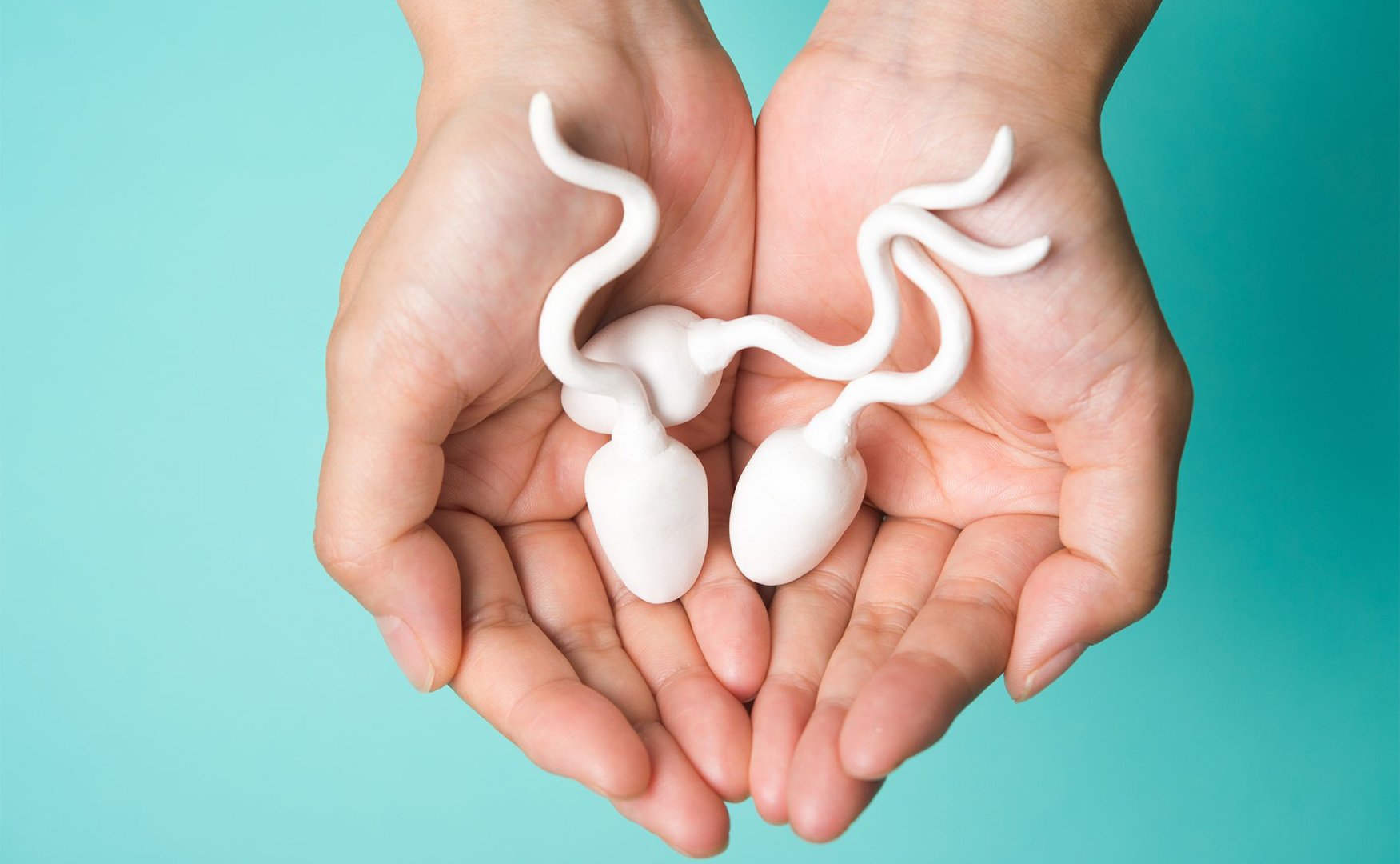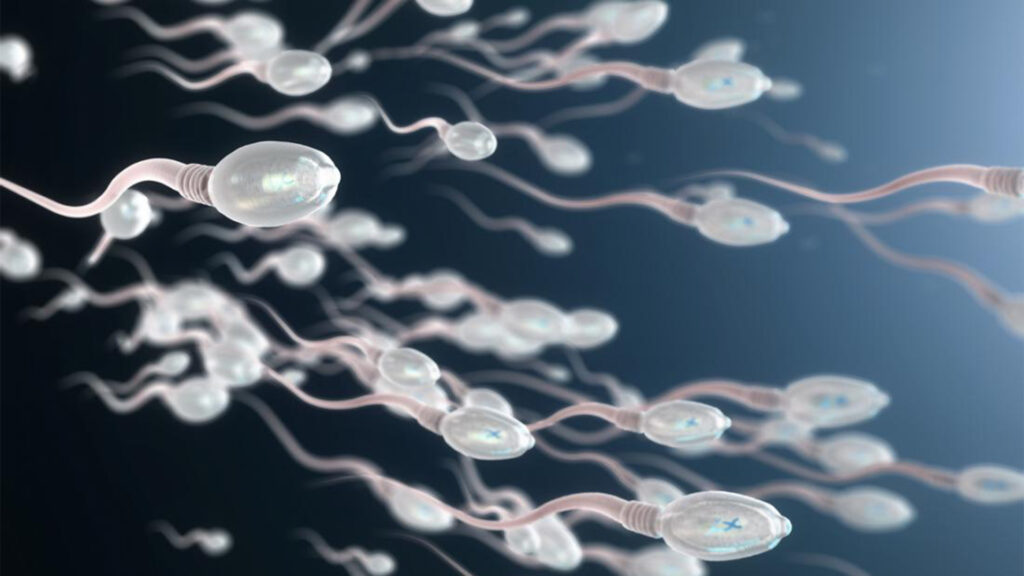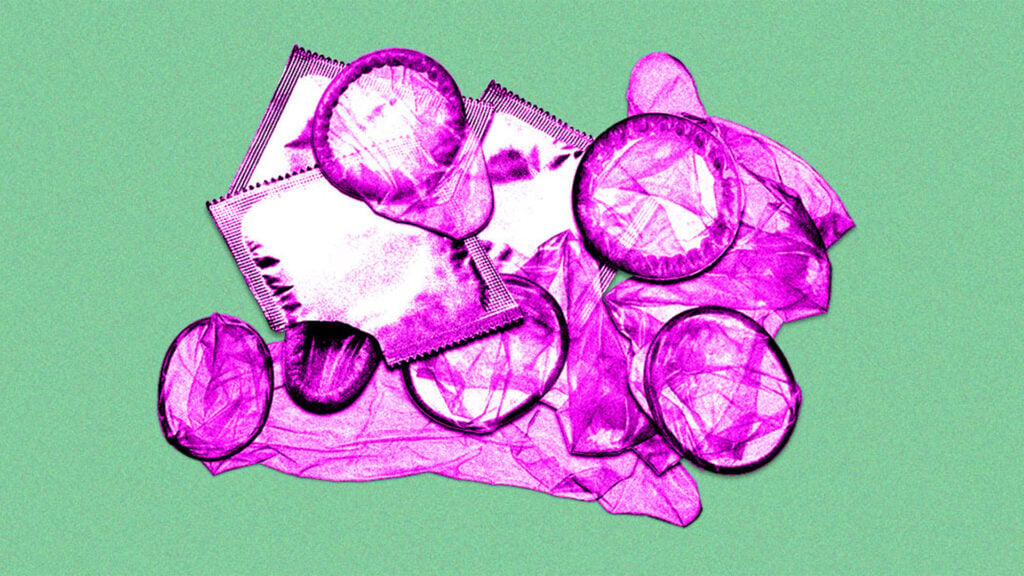
This one’s for you, fellas. Or ladies, if you’ve ever Googled questions about your guy’s funky tasting sperm or how long semen can live outside the male body for...you can stay, too.
When it comes to semen...there’s a lot of questions. Most of these questions I’ve pulled off Google’s most frequently asked questions area. It’s not very surprising that these questions have been searched to death - semen is very interesting, after all.
In fact, did you know that semen contains about 5-10 calories per ejaculation?
If you’re interested in other cool facts about semen, you’re in luck!
Okay. Here we go…
Sperm and semen? They are two different things.

If you already knew that, you’re likely wondering who doesn’t know that...but honestly - there are a lot of people who use those words interchangeably, not knowing that they are completely different things. So naturally, this is where we start our magical journey into the land of male cum.
Sperm vs semen...what’s the difference?
Sperm are microscopic male reproductive cells, semen is the word used to describe the fluid that contains those sperm cells. Sperm carries all the genetics - semen has no purpose other than nourishing the sperm cells and keeping them viable.
Each ejaculation includes up to 5% volume of semen. This semen contains all kinds of good things (we’ll get more into that later) that can sustain the sperm and ensure motility, which helps with conception (if that’s the main goal).
How much sperm is in semen?
So...this is where it gets crazy.
The typical sperm count (which is the amount of sperm per mL of semen you produce) ranges from 15 million sperm to 200 million sperm per milliliter (mL) of ejaculate. The average ejaculation produces anywhere from 2mL to 5mL.
Putting my rusty math skills to the test (with the help of Google), let’s say you have 15 million sperm per mL of ejaculate (which is on the lower end of typical). If you have even just 2mL (also on the lower end), every time you cum, you’re releasing at least 30 million sperm out into the wild.
How big are sperm cells?
From head to toe (or tail, in this case), the human sperm cell measures about 50 micrometers. If you have no idea how short that is, it translates to about 0.05mm or about 0.002 inches.
Where (and how) is sperm produced?
Sperm production happens within the testicles. After puberty, the male body will produce millions of sperm cells every single day.
How it works: there is essentially a system of “tubes” within the testicles, they house the germ cells that hormones (including testosterone, the male sex hormone) help turn into sperm. Each of these cells divides and changes until it resembles a tadpole (with a head and short tail). This process takes about 2.5 months.
The tails push the sperm into an area behind the testicles called the “epididymis”, and the sperm travel in this area to complete their development. Once this process is complete, the sperm move to the “vas deferens”.
When a man is sexually aroused and stimulated, the sperm are then mixed with seminal fluid (which is produced by the prostate gland) - and this is how semen is formed. When ejaculation occurs, the semen (along with the sperm inside) are pushed out through the urethra (in what is, hopefully, an incredible climax).
Do sperm know where to go?
While it may seem like a silly question, it really isn’t. Many researchers believe that sperm cells use complex mechanisms to find the waiting egg cell within the female body.

They swim closer to higher concentrations of chemotaxis, which is a molecule that is released by the female egg.
They also gravitate towards high-temperature areas of the reproductive tract. While a female is ovulating (meaning there is an egg ready for fertilization) her basil temperature is slightly higher, allowing the sperm to more easily find the egg in time for conception.
How long does sperm live?
Sperm can actually be active within the vagina for several days (between 2-5) after intercourse, which is something many people don’t consider when having sex without protection.
Outside in the real world, though, sperm don’t live very long at all (so your crusty towel doesn’t have living sperm on it...don’t worry!)
The lifespan of your sperm is actually pretty cool...
You know how when you’re looking at a star, you’re actually looking at something that lost it’s light years and years ago, but to you, it still shines bright in the night’s sky?
Well...that’s sperm for you.
What I mean by that is that by the time a sperm leaves your body, it’s actually lived an entire life already. It takes about 64 days for the male body to produce sperm. Then, it’s around 24-28 more days for it to be transported and ejaculated out of your system.
Cool, right?
To know more about your sperm count, you will likely undergo a test called semen analysis. This analysis can tell you a lot about the health of your sperm, your motility rate, and your sperm count.

What is a semen analysis?
A semen analysis measures the amount (and quality) of a man’s semen and sperm.
How it works:
All of this information is then compiled into an analysis report that will be discussed with you by your health care professional to help you better understand the health of your sperm.
What does it mean to have a “low sperm count”?
A lower sperm count means that the fluid (the semen) that you ejaculate contains less sperm than what is considered typical. Usually, anything below 15 million sperm per mL of semen is considered on the “low end” of typical and may require further testing to see if there is a problem.
Does your sperm count decrease as you get older?
While women stop producing eggs (and estrogen levels decline) at some point in their lives (menopause), males don’t actually stop producing viable sperm. While it is true that your sperm count may lower due to things such as age and health decline, the decline is generally slow and males don’t totally stop producing sperm.
To read more about male fertility, read this LiveScience article.
How much is required to get someone pregnant?
This is a question that has been Google’d in all its forms: how much sperm does it take for a woman to get pregnant? Whether you’re 35 and trying for your first baby or 16 and praying you didn’t get pregnant the last time you had sex - we’ve likely all wondered just how much is needed for a woman to get pregnant.
Well...the answer is a bit complex...but in simple terms: it only takes one sperm to fertilize an egg. However, something to note is that for each sperm that reaches the female egg, there are millions that don’t. Other things (such as the period of ovulation for the female and the motility/health of the sperm) are also determining factors here.
Are tight pants really bad for sperm counts?
While you may scoff at the idea, tight underwear or pants can actually affect your sperm counts. Well, actually, the temperature of the testes is what affects the sperm count, but what you wear can affect the temperature, indirectly affecting your sperm count.
Testes shouldn’t overheat, but they can when a man wears tight underwear or pants. If the testes are too warm (even just a few degrees above normal), they are not able to produce as much sperm, which can result in lower sperm counts.
No, your high school girlfriend (probably) wasn’t lying when she said she was allergic to your semen and that’s why she couldn’t swallow. Not that we need a reason not to swallow (because that should be our choice) - but really...you can be allergic to semen.
It’s not super common, but it does happen.
Common symptoms usually occur within 10 minutes of contact with semen and can include:
This condition can be misdiagnosed as vaginitis (which is inflammation of the vagina) as they do present rather similarly. A semen allergy can also mimic the symptoms of yeast infections or various STIs such as herpes.
It’s estimated that semen allergies are present (more commonly in women) in up to 40,000 people within the United States.
Alone, sperm don’t have predetermined sex - they are not inherently male or female - but they do play a crucial role in determining the sex of a fetus.
Your sperm carries either X or Y chromosomes - Y chromosome sperm can swim a bit faster and don’t tend to live as long, but this actually doesn’t play any factor in determining your chances of fathering a male or female child.
You have roughly the same amount of X and Y chromosome sperm (unless you have a motility or sperm count issue diagnosed by a doctor) - so generally the odds are 50/50
STIs can be more than a pain in the ass, they can also affect your sperm - but maybe not in the way you suspect.
Does an STI damage my sperm?

STIs don’t typically harm sperm production (although some strains of chlamydia can impair production), but instead can affect how quickly and efficiently the sperm travel throughout your system, which can ultimately mess with your sperm count.
Can an STI be passed through semen?
STIs can, in fact, be transported through semen. This is the most common way to infect an intimate partner with something you already have - however, it’s totally possible to contract (or give) an STI even if the ejaculation doesn’t happen within the vagina.
The “pull out method”, for example, is not fool-proof when it comes to pregnancy nor the prevention of STIs. STIs can be transmitted through contact with vaginal fluid, pre-cum, through contact with open sores or cuts and even from skin-to-skin contact.
If you have an STI, you need to share this information with your potential sexual partners before any contact occurs.
A vasectomy is what is most commonly referred to as male sterilization. It’s a surgical procedure that blocks off the small tubes in your scrotum so sperm can’t leave your body when you ejaculate.
Vasectomies are meant as a permanent form of pregnancy prevention. The name refers to the tubes in your scrotum that are blocked off during the procedure, they are called vas deferens.
How it works:
To learn more about vasectomies (how they work, how they feel, what to expect), check out this article.
When it comes to the health of your sperm, it’s natural to have questions. After all, things that you do in your day-to-day life (such as what you eat and how physical you are) can affect your sperm count and quality.

How do you measure the quality of your sperm?
The quantity of sperm (how much you have) can determine how healthy they are and plays a significant role in determining how healthy your sperm are.
You’re most likely to be fertile if your ejaculate contains a minimum of 15 million sperm per mL. Too little sperm might make it more difficult to get pregnant due to less sperm making it to the egg.
What exactly impacts the health of my sperm?As I said before, there are a variety of things in your day-to-day life that can affect your sperm health, and these things can include:
What exactly is in semen?
While we know there are sperm (a lot of sperm) in semen...what else is in there?
Well, semen can contain amino acids, citric acid, phosphorous and potassium. Your prostate gland will also add zinc, calcium, sodium (which can explain the salty taste), and various enzymes.
Does bad-tasting semen indicate there is a problem?
Most of the time, the taste of semen can be described as mild, a bit bitter, maybe a bit salty or sweet. Bad tasting semen doesn’t necessarily indicate there is a problem but can be a little reminder to you to eat healthier, exercise a bit more and take better care of yourself - as all of these things can affect the way your semen tastes and smells.
Can I improve the taste of my semen?
Okay - myth-busting time: there is no actual scientific evidence that proves what you eat alters the taste of your semen.
People swear by this: pineapples make your cum taste sweeter, beer makes your cum taste bitter...all of this is just conjecture. However, just because there isn’t proof doesn’t mean people don’t believe it.
Many people think that foods that produce strong odors (like broccoli, for example) can make semen taste worse - whereas eating citrus fruits can improve flavor. While there is no proof of any of this, researchers do suggest that if there are foods that make your body odor smell worse, these foods may (in some way) also impact your semen taste and smell.
Can you get pregnant from swallowing semen?
No, you can’t. The body digests semen similarly to how it would digest any other food or drink - by breaking it down in the stomach. A person cannot become pregnant unless semen enters the vagina in some way and travels to fertilize a healthy egg.
The tricky thing here is that you can get pregnant if there is any residual cum on the man’s penis when he enters your vagina. So, if you give him the blowjob of his life and he decides to repay you by fucking you silly without wiping the excess cum off his penis or wearing a condom, there is a chance sperm can still be present.
This article wouldn’t be complete without some random, interesting and actually kind of crazy facts about semen (because I got a little sidetracked during my research) - but also because it really is super interesting.

For example - did you know...
You can’t freeze semen the way some people do in movies or on TV...it’s actually a really intense process.
According to Seattle Sperm Bank, sperm is typically frozen in a liquid nitrogen vapor that gradually cools the vials containing the sperm to something around -175 degrees Celsius...so I don’t think the “super cold” setting on your freezer is going to cut it.
The amount of sperm one male will produce in his lifetime is…well, insane.
While we’ve established a crazy amount of sperm is produced in each ejaculation, an INSANE amount of sperm is created with a man’s lifetime. Something close to 2 trillion (yes, trillion, with a T) is produced within a man’s lifetime.
There is a crazy amount of nutrients in semen (so, maybe swallowing isn’t so bad…)
According to Dr. Michael Reitano, sperm contains quite a few good things such as vitamin C, B12, calcium, lactic acid, magnesium zinc, and potassium.
There’s that one guy who cooks with his semen…
Chef turned author Paul (Fotie) Photenhaur teaches us all we need to know about cum-recipes with his two cookbooks - one that focuses on food and one that focuses on cocktails infused with semen (I’m going to sidestep the obvious “cocktail” joke here…).
According to Fotie, the taste of semen is complex and dynamic - yet, despite all the positive qualities to semen (including the nutrients), there is still quite a bit of backlash around using semen as a cooking tool.
Fotie hopes to change all that and I’ve got to say...good luck to him because this cookbook is actually kind of interesting to read through.
Precum doesn’t actually contain much sperm, but you still need to be careful.
The idea that precum can get you pregnant is something every teenager has thought about (in-depth) after her boyfriend assures her “pulling out” is a safe method of birth control. (No? Just me?)

Well, the idea behind that is technically correct...there isn’t much actual sperm in precum…but “not much” doesn’t equal “none” - so there is still a chance you can get pregnant from precum. Not only that, but precum can spread STIs just like ejaculate can.
Frequent sex or masturbation can improve your sperm quality.
Good news, fellas: the more you wank, the healthier your sperm will be, according to science.
Sperm is actually kind of magical if you think about it.
Sperm are the only human cells that are produced in one person that is designed to survive (and thrive) in another. Our bodies are designed and have evolved to fight off and attack foreign substances...but not sperm. Nope - sperm gets a pass because it’s just that awesome.
In fact, semen (and the sperm included in semen) are protected against the male body’s immune system. If you think about it, the male body doesn’t produce sperm until puberty - by then, your body has had over a decade of getting used to what substances are allowed in your body, what is considered “normal” and what is foreign and should be attacked for your protection.
Typically, because sperm is a “foreign” substance to your already developed immune system, it should be considered an invader. But the testes are referred to as an “immunologically privileged site”, which means they are shielded off (in many ways) from the rest of your body so your immune system can’t attack the newly formed sperm cells.